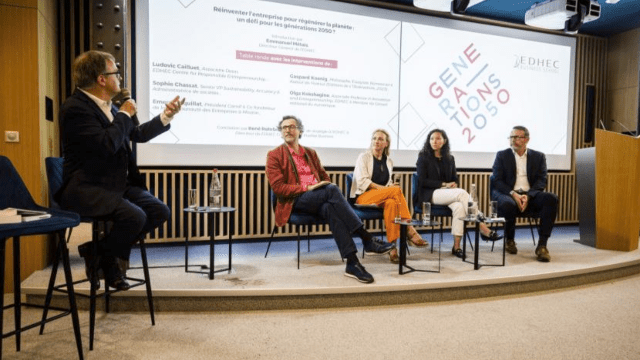This article was originally published on edhec.edu - 05/07/2024
On Tuesday, July 2, 2024, EDHEC Business School's Paris campus hosted the first edition of the EDHEC Vox Dialogues. The aim of this new series of conferences is to provide a space for reflection and discussion in line with the key priorities of the school's new 2024-28 strategic plan. First theme: "Reinventing business to regenerate the planet: a challenge for the 2050 generation?" EDHEC invited professor-researchers from the school, representatives from the business world, and philosopher and essayist Gaspard Koenig to sketch out possible answers to this vast question.
Defining the "net positive" company
Chaired by François Miquet-Marty, Chairman of the Groupe Les Temps Nouveaux, the round table began with an introduction to the concept of the "net positive" company. Emery Jacquillat, Chairman of Camif and co-founder of the Communauté des Entreprises à Mission, and Ludovic Cailluet, Associate Dean of the EDHEC Centre for Responsible Entrepreneurship, respectively presented the notions of positive impact (the environmental, social and societal benefits generated by the company) and 'Responsible by design' (the integration of the principles of social and environmental responsibility into the design of the company). These two principles are at the heart of the 'net positive' business model, which refers to organisations that create more social, environmental and economic value than they consume or destroy.
Olga Kokshagina, Associate Professor in Innovation and Entrepreneurship at EDHEC and Member of the National Digital Council, showed how technology can be a solution for reinventing the way we work, our production and governance models, and more generally our organisational models.
Sophie Chassat, Senior VP Sustainability at Accuracy and Company Director, stressed that the transition of companies towards sustainable models cannot be achieved without the convergence of general interests, such as the preservation of biodiversity, and private interests, such as profit.
Creativity and innovation: drivers of change
The second part of the round table was devoted to the novel Humus, in which Gaspard Koenig tells the story of two agronomy students, each keen to respond in their own way to the ecological crisis. Kevin launches a vermicomposting start-up, while Arthur strives to preserve the family farm. Their journey, from the Normandy countryside to Silicon Valley, explores the current challenges of social mobility, ecology and rural life.
In his speech, Gaspard Koenig highlighted the capacity of ecology to inspire new paths of transformation in the service of the common good. He also commented on the trajectories of the characters in Humus, to highlight the tension between the desire to build a more sustainable world and the constraints imposed by reality.
Shaping the future
The evening continued with a round-table discussion of the speakers, during which each put into perspective different business models (Anglo-Saxon and European companies), different types of governance (family businesses and those run by different shareholders) and different inclusion policies. The aim is to come up with proposals for virtuous business and governance models.
René Rohrbeck, Professor of Strategy at EDHEC, concluded the event by presenting the objectives of the Centre for Net Positive Business, which he is in the process of creating as part of the projects of EDHEC's new Générations 2050 strategic plan. The mission of this new research centre is to contribute to the evolution of business models and to build a benchmark for measuring this positive impact.

Comments0
Please log in to see or add a comment
Suggested Articles


